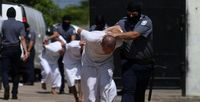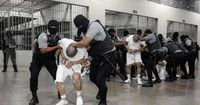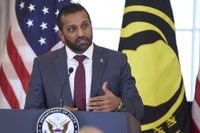On Monday, March 17, 2025, Francisco Javier Román-Bardales, a prominent leader of the notorious MS-13 gang, was arrested in Mexico and swiftly extradited to the United States. The event marks a significant step in the ongoing battle against organized crime in North America, with U.S. law enforcement officials praising the cooperation between Mexico and the American authorities.
Román-Bardales, who is on the FBI's Ten Most Wanted list, was apprehended on a highway in Veracruz, Mexico. Following his arrest, he was transferred to Mexico City before being extradited to the U.S. where he faces multiple charges, including drug trafficking, extortion, and conspiracy. His role in directing the violent and criminal activities of MS-13, which operates in the U.S., Mexico, and his native El Salvador, has made him a target for law enforcement.
MS-13, recognized as "America's number one gang," was designated a terrorist organization by the Trump administration in early 2025. This classification underscores the seriousness of the gang's operations and the U.S. government's commitment to combating its influence. The FBI has alleged that Román-Bardales engaged in various criminal enterprises, including conspiracy to provide material support to terrorists and facilitating the concealment of drug trafficking resources.
The capture and extradition were confirmed by FBI Director Kash Patel, who took to social media soon after to laud the collaborative efforts that culminated in Román-Bardales's arrest. “This is a major victory for our law enforcement partners and a safer America,” Patel stated. His acknowledgement highlights the importance of international cooperation in addressing cross-border crime.
Patel's statement also reflects how these operations can contribute to greater public safety in the U.S. and strengthen partnerships with Mexican law enforcement. The success of this extradition is indicative of a larger strategy that has seen increased accountability for gang leaders and drug traffickers operating between the two countries.
In recent weeks, the Mexican government has ramped up its crackdown on organized crime, taking strong actions against other cartels, including the infamous Sinaloa cartel. Under President Claudia Sheinbaum's leadership, Mexico is prioritizing the establishment of robust security relations with the United States, which involves demonstrating its commitment to combating drug trafficking and violent crime. This initiative is not only aimed at improving domestic safety but also at preventing potential economic repercussions, such as tariffs from the U.S.
As part of these intensified actions, Mexican authorities have successfully deported several key figures from drug trafficking organizations to the U.S. Recently, 29 members of various cartels have been handed over to American authorities, one of whom was Rafael Caro Quintero, linked to the 1985 murder of a DEA agent. This coordinated effort represents a bid by Mexico to align its law enforcement initiatives more closely with U.S. policies.
The recent developments serve a dual purpose: addressing the urgent need for enhanced public safety in U.S. neighborhoods threatened by gang violence while simultaneously reinforcing Mexico's status as a reliable security partner to the United States. One U.S. official remarked, “Mexico has proven to be a reliable partner in our fight against organized crime.”
Looking forward, Román-Bardales is expected to face trial in New York, where the nature and severity of the charges against him will be fully examined. His extradition not only opens a new chapter in his legal proceedings but also signals a commitment to combating drug-related violence that affects communities across the United States.
As both nations enhance their law enforcement collaboration, the hope is that such strategic actions will lead to the dismantling of entrenched criminal organizations like MS-13, ultimately paving the way for safer environments on both sides of the border.



